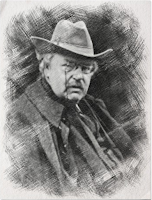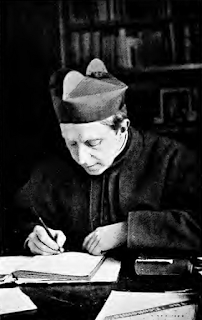A brilliant analysis of The Lord of the World, by Msgr Robert High Benson.
From The Just Third Way
By Michael D. Greaney
In the previous posting on this subject, we closed by asking the question how, if socialism and modernism (which doesn’t mean modernity) are so anti-human or contrary to human nature, how on Earth did they become so popular? Let’s begin by taking a look at a novel from the beginning of the last century that a lot of people think they know something about, but usually don’t.
In 1905, Monsignor Robert Hugh Benson wrote in a letter to his mother,
I have an idea for a book so vast and tremendous that I daren’t think about it. Have you ever heard of Saint Simon? Well, mix up Saint Simon, Russia breaking loose, Napoleon, Evan Roberts, the Pope, and Antichrist; and see if any idea suggests itself. But I’m afraid it is too big. I should like to form a syndicate on it, but that it is an idea, I have no doubt at all. (Robert Hugh Benson, December 16, 1905, quoted in C.C. Martindale, S.J., Life of Monsignor Robert Hugh Benson. Longmans, Green and Co., 1916, II.65-66.)
Benson was referring to his apocalyptic satire, Lord of the World, a masterful — if in hindsight barely fictional — vision of a future world that had completely surrendered to socialism and modernism. In Benson’s day it was what the socialists and modernists had dreamed of creating for nearly a century: the terrestrial paradise, the Kingdom of God on Earth.
 |
| Aristotle |
But what do we mean by socialism and modernism? First, it must be clearly understood that in this blog series, terms are given their natural law meaning — including natural law itself — as used within the Aristotelian-Thomist framework and applied in Catholic social teaching.
That is, the natural law — the general code of human behavior — is based on reason (lex ratio), not faith or opinion, even majority opinion (lex voluntas). Socialism, while best summarized by Karl Marx as the abolition of private property in capital, can be stated broadly as any philosophy or political theory (or anything else) that shifts sovereignty — and thus natural rights, dignity, and personality — from the human person to the collective or some form of society.
 |
| G.K. Chesterton |
Modernism, which can be understood as the theology of socialism, is anything that shifts worship away from an understanding of God based on reason, to one based on faith or opinion that contradicts what is discerned by reason. As G.K. Chesterton noted, “[A]pparently anything can be called Socialism, . . . If it means anything, it seems to mean Modernism; in the sociological as distinct from the theological sense. In both senses, it is generally a euphemism for muddle-headedness.” (G.K. Chesterton, “There Was a Socialist,” G.K.’s Weekly, May 10, 1930; cf. Ubi Arcano, § 61.)
A world gone mad by putting Earth in the place of Heaven (socialism) and man in the place of God (modernism) was the theme of Benson’s Lord of the World. In common with the Great Reset, the problem was that the achievement of the goal of the Kingdom of God on Earth would — in Benson’s opinion — require such fundamental changes in humanity as to deny nature, and (not surprisingly), the Creator of Nature. As Fulton Sheen explained a generation later in his doctoral thesis, God and Intelligence in Modern Philosophy (1925), modernism and socialism invert the whole of reality:
 |
| Fulton J. Sheen |
Putting the whole philosophy in a formula which expresses a perversion of the traditional notions: —
Mind is confused with Being.
Grace is confused with Nature.
Man is confused with God.
. . . In the twentieth century man makes God to his own image and likeness. (Fulton J. Sheen, God and Intelligence in Modern Philosophy. New York: IBE Press, 2009, 320. See also Sheen’s follow-up, Religion Without God, 1927.)
 |
| Sir George Chesney |
In short, as Chesterton noted in his Introduction to Sheen’s book, “They begin by bowing down to man as the image of God; and then forget the God and bow down to the graven image.” (Ibid., 11.) As Sheen later remarked, the seemingly inevitable result of efforts to create a Heaven on Earth is a living Hell.
Admittedly, this is not how many people today understand Lord of the World, the best known of Benson’s “sensational novels.” Possibly because he was able to gauge the likely result of certain trends in Edwardian society accurately, it has been reinterpreted as prophecy . . . something that annoyed the author more than a little.
Ironically, much of what modern readers believe to be purely the product of Benson’s imagination were elements lifted wholesale from the “future war” subgenre of science fiction. With hundreds, even thousands of offerings featuring fantastic plots and often even more fantastic technology, a great coming war was a popular theme from its debut the year of Benson’s birth with Sir George Chesney’s novella, The Battle of Dorking (1871) until 1914 when the real thing turned fantasy into reality. Even humor of a sort made its appearance, e.g., Frank R. Stockton’s The Great War Syndicate (1889) and P.G. Wodehouse’s The Swoop! or, How Clarence Saved England (1909).
 |
| Msgr. Robert Hugh Benson |
Benson’s real achievement in Lord of the World was not his alleged inventiveness or presumed prophecy. Rather, it was the way he wove all the things that the intellectuals and upper classes of Edwardian England believed good about the world and bad about religion into a tapestry that turned all their assumptions upside-down.
Yet even then, Benson’s feat was not his originality. Ultimately, his satirical social and religious commentary consisted of heeding warnings from the popes and applying an extremely exaggerated version of what could happen as a result of ignoring principles of Catholic teaching. Rome had been explicit about the danger since 1832, when Pope Gregory XVI issued Mirari Vos, the first social encyclical.
And therein lies a tale that in some ways is more fantastic, even more shocking, than Lord of the World and what to many seems its final realization in the Great Reset.
No comments:
Post a Comment
Comments are subject to deletion if they are not germane. I have no problem with a bit of colourful language, but blasphemy or depraved profanity will not be allowed. Attacks on the Catholic Faith will not be tolerated. Comments will be deleted that are republican (Yanks! Note the lower case 'r'!), attacks on the legitimacy of Pope Leo XIV as the Vicar of Christ, the legitimacy of the House of Windsor or of the claims of the Elder Line of the House of France, or attacks on the legitimacy of any of the currently ruling Houses of Europe.